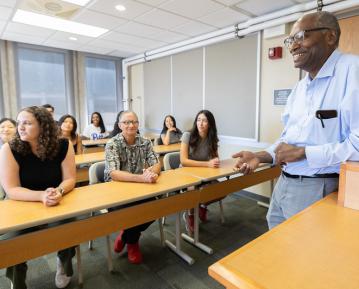The Bioinformatics Tutor Ideas
The Bioinformatics Tutor Ideas
Blog Article
Some Known Details About Bioinformatics Tutor
Table of ContentsThe smart Trick of Bioinformatics Tutor That Nobody is Talking AboutA Biased View of Bioinformatics TutorRumored Buzz on Bioinformatics TutorThe Ultimate Guide To Bioinformatics TutorBioinformatics Tutor Can Be Fun For Anyone
Of the total amount participants entailed in the training, 80% were students from public higher education organizations, while the remaining 20% came from exclusive institutions. To get approved for a certificate of participation, pupils were required to go to a minimum of 90% of the overall training hours. As a result of this requirement, an impressive 95% of the individuals efficiently obtained their certifications, having not only met the minimum presence criteria yet likewise finished all assigned tasks throughout the training.
During the height of the COVID-19 pandemic, especially between June and August 2020, the task group was tasked with arranging specialized training in bioinformatics. This training was particularly targeted at students from the research study group Core for Research in Applied Computing at the Federal University of Pará (UFRA) The adaptation to remote knowing systems as a result of the pandemic developed a possibility to explore new teaching methodologies and electronic tools that enhanced both reach and performance.
This program was created to supply an easily accessible yet comprehensive overview of Artificial Knowledge strategies, particularly as applied in bioinformatics (Bioinformatics Tutor). This virtual style allowed involvement from pupils across Brazil, numerous of whom could not have had the chance to attend in-person sessions.
The Best Strategy To Use For Bioinformatics Tutor
A significant attribute of this training course was its emphasis on hands-on understanding. About 50% of the total training hours were dedicated to useful activities where trainees constructed smart versions and applications in a series of scientific domain names, consisting of genetics, molecular biology, and ecological information analysis. Extensively used tools and frameworks such as Spyder, Google Colab, Jupyter Notebooks, and Orange were integrated right into the coursework. These platforms made it possible for pupils to participate in real-time information control, model training, and algorithm trial and error.
The training course drew in 80 individuals in total. Sixty of them were connected with different higher education institutions in the state of Pará, while the continuing to be twenty originated from organizations situated in 5 other Brazilian states. This broad geographical depiction highlighted the national passion in bioinformatics and the growing demand for specialized abilities around. By introducing Expert system in a sensible and pertinent context, the initiative served to link the void in between concept and real-world application, giving trainees with a strong structure for future research or work in the field.
The training campaign formed component of a wider academic outreach initiative known as the Bioinformatics when traveling job. This task has, throughout the years, introduced lots of pupils to the globe of bioinformatics and computational biology. The events held under this umbrella initiative have actually happened across multiple regions and years, as summed up in Table 1 (List of events, places, years, and overall varieties of pupils and trainers)
Numerous of these teams, initially brought together by their engagement in training occasions, have because gone on to generate independent clinical research in collaboration with local academic institutions. The training not just promoted clinical reasoning within the context of bioinformatics however additionally sparked collaborative relationships that expanded past the training setting.
The Facts About Bioinformatics Tutor Revealed
The task itself was conceived and organized by MB and RR, who looked after the planning and execution of each action. Lectures were supplied by a multidisciplinary group containing megabytes, FA, EF, KP, JS, DM, SN, LP, LG, RR, ih, and air conditioner. The same team, omitting IH and RR, also acted as tutors for the practical training components. Funding for the job was supplied with the grant 88887.200562/ 2018-00 from CAPES. The writers extend their gratefulness to everybody that contributed to the realization of this job, whether directly or indirectly, since its creation.
The Federal University of Pará's Workplace of Study (PROPESP/UFPA) likewise supplied economic support, especially for the production of the last manuscript. The writers declare no business or economic conflicts of rate of interest that might have affected the study. Furthermore, all analyses and point of views expressed in this short article are entirely those of the writers and do not always reflect those of their corresponding establishments, the publisher, editors, or reviewers associated with the publication procedure.

Top Guidelines Of Bioinformatics Tutor
From a pedagogical viewpoint, the training method used in the training was deliberately interactive. Classes were performed in a fashion that encouraged pupil engagement and discussion, surpassing rote memorization to discover just how ideas are created, used in life, and evaluated in academic settings. The instructional philosophy focused on nurturing both strong and struggling official statement pupils, providing individualized support, and building confidence via continual mentorship and perseverance.

Each group, being composed of approximately 36 participants, was supported by three advisors-- a lot of whom were postdoctoral researchers with customized proficiency. These mentors not just helped create the group jobs yet also Get More Information promoted their execution, making sure that each research question was both relevant and suitably challenging. The goal was to give a naturally sensible context that participants can check out via open-ended purposes and accessibility to curated datasets.
For added insights into the approach and results of this project-based knowing approach, readers are directed to S1 Text, that includes in-depth summaries of the instructional framework, evaluation techniques, and job motifs utilized in the training sessions.
7 Simple Techniques For Bioinformatics Tutor
Of the overall individuals included in the training, 80% were students from public higher education institutions, while the remaining 20% came from exclusive establishments. To qualify for a certificate of involvement, students were called for to attend at the very least 90% of the complete training hours. Especially, past the students who enlisted in the training sessions, 7 seasoned trainers took part in providing the programs, while 3 devoted research teachers worked with the total training procedure. Approximately 50% of the complete training hours were dedicated to useful activities where students developed intelligent versions and applications in a variety of clinical domain names, consisting of genes, molecular biology, see this website and environmental data evaluation. The training not just promoted scientific thinking within the context of bioinformatics yet likewise stimulated collaborative relationships that extended beyond the training atmosphere.
Report this page